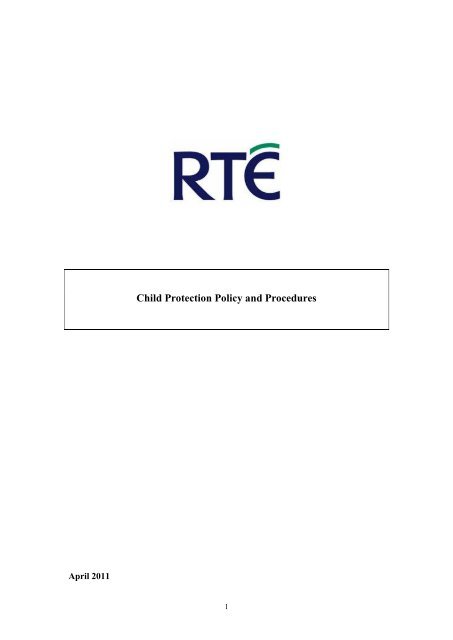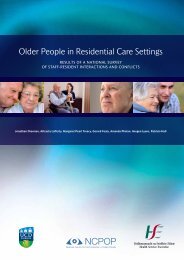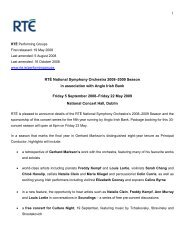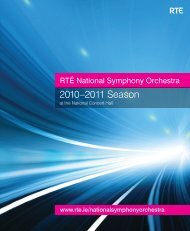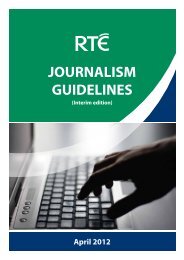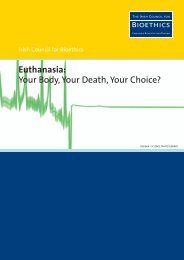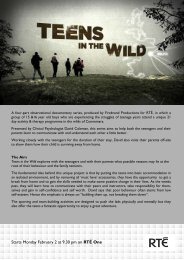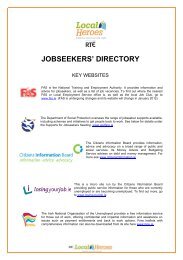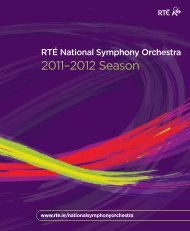RTÃ Child Protection Policy and Procedures...
RTÃ Child Protection Policy and Procedures...
RTÃ Child Protection Policy and Procedures...
You also want an ePaper? Increase the reach of your titles
YUMPU automatically turns print PDFs into web optimized ePapers that Google loves.
<strong>Child</strong> <strong>Protection</strong> <strong>Policy</strong> <strong>and</strong> <strong>Procedures</strong><br />
April 2011<br />
1
TABLE OF CONTENTS<br />
Page<br />
Introduction 3<br />
Section 1: <strong>Child</strong> <strong>Protection</strong> <strong>Policy</strong> Statement 4<br />
Section 2: RTÉ‟s Code of Behaviour 5<br />
Section 3: <strong>Child</strong> Welfare: Transport <strong>and</strong> Attending on Site 8<br />
Section 4: Reporting <strong>Procedures</strong> <strong>and</strong> Responsibilities 12<br />
Section 5: Recruitment, Selection <strong>and</strong> <strong>Child</strong> <strong>Protection</strong> 14<br />
Appendices<br />
Appendix 1: Key Principles <strong>and</strong> Definitions of Abuse as issued by the Department of<br />
Health & <strong>Child</strong>ren 1999<br />
Appendix 2: Checklist<br />
Appendix 3: Purpose of Engagement Statement<br />
Appendix 4: Risk Assessments/ Accident Reports<br />
Appendix 5: Staff Disclosure Form<br />
2
INTRODUCTION<br />
This policy establishes the responsibilities of all who work for RTÉ including<br />
contractors with regard to the protection of children <strong>and</strong> young people when working<br />
with, or when brought into contact with, children <strong>and</strong> young people.<br />
In the context of child protection, children <strong>and</strong> young persons refers to anyone under<br />
18 years of age. For the purposes of this policy young persons can be regarded as<br />
children between the ages of 15 <strong>and</strong> 18 years of age.<br />
Given the nature of broadcasting <strong>and</strong> the interaction which takes place with various<br />
people such as staff, members of the public, contractors, freelancers, independent<br />
companies <strong>and</strong> visitors these guidelines will apply to all concerned. While it is not<br />
possible to legislate for every eventuality in this policy RTÉ staff should be aware that<br />
the spirit of the policy as set out in Section 1 <strong>Child</strong> <strong>Protection</strong> <strong>Policy</strong> Statement as<br />
well as the precise wording of the detailed processes <strong>and</strong> procedures should be<br />
observed at all times. It should be noted that editorial programme content will not be<br />
affected by this policy.<br />
This document should be read in conjunction with our existing “RTÉ Programme<br />
St<strong>and</strong>ards <strong>and</strong> Guidelines 2008” (Relevant section pages 60 to 68).<br />
3
SECTION 1 – CHILD PROTECTION POLICY STATEMENT<br />
RTÉ is committed to a child-centred approach to our work with children <strong>and</strong> young<br />
people. It is central to the philosophy of RTÉ that children are unconditionally<br />
respected <strong>and</strong> kept safe from harm while in our care. It is important to ensure that<br />
normal practices <strong>and</strong> behaviour within our organisation actively promote the delivery<br />
of a safe engaging environment, where the welfare of the child/young person is<br />
paramount. These guidelines assist RTÉ in adhering to the principles as set out in the<br />
“<strong>Child</strong>ren First National Guidelines for the <strong>Protection</strong> <strong>and</strong> Welfare of <strong>Child</strong>ren”, as<br />
issued by the Department of Health & <strong>Child</strong>ren.<br />
The guiding principles are:<br />
<br />
<br />
<br />
The welfare of the child or young person is the paramount consideration <strong>and</strong><br />
should be at the heart of the RTÉ production<br />
All children <strong>and</strong> young people, regardless of age, disability, gender, racial or<br />
ethnic origin, religious belief <strong>and</strong> sexual identity have a right to protection from<br />
harm or abuse<br />
It is the responsibility of all staff of RTÉ including contractors to promote the<br />
protection of children <strong>and</strong> young people <strong>and</strong> to comply with this policy. Staff<br />
are always expected to maintain a sense of proportion, apply common sense to<br />
situations <strong>and</strong> protect the child's welfare as a priority.<br />
RTÉ undertakes to:<br />
<br />
<br />
<br />
<br />
<br />
<br />
<br />
<br />
Treat children <strong>and</strong> young people with care, respect <strong>and</strong> dignity<br />
Recognise that those working in RTÉ will be perceived by children <strong>and</strong> young<br />
people as trusted persons <strong>and</strong> therefore all staff must comply will this policy<br />
Ensure communication with children <strong>and</strong> young people is open <strong>and</strong> clear<br />
Assess the risks posed to children when undertaking activities. This process<br />
must form part of the overall programme risk assessment<br />
Ensure staff avoid physical contact with children <strong>and</strong> young people except for<br />
reasons of health <strong>and</strong> safety, or under supervision<br />
Respond to any allegations appropriately <strong>and</strong> implement a disciplinary process<br />
as appropriate<br />
In order to ensure the Safety, Health <strong>and</strong> Welfare of children involved in all<br />
RTÉ programme activities all use of any programme material will be subject to<br />
the terms <strong>and</strong> conditions of the original arrangement or contract<br />
Review this policy annually based on RTÉ‟s experience of its operation <strong>and</strong> in<br />
light of any legislative changes which arise in the area of <strong>Child</strong> <strong>Protection</strong>. The<br />
review will be undertaken by the Group Head Human Resources in conjunction<br />
with RTÉ‟s Safety Officer.<br />
4
SECTION 2 – RTÉ‟S CODE OF BEHAVIOUR<br />
In order to ensure mutual protection, staff/ volunteers/ guest artists/ contributors,<br />
contractors <strong>and</strong> other organisations working with RTÉ need to be familiar with the<br />
following code: Senior managers must ensure that the behavioural requirements of<br />
this policy are communicated to, <strong>and</strong> clearly understood by those working with<br />
children.<br />
Code of Behaviour: <strong>Child</strong> Centred Approach<br />
<br />
<br />
<br />
<br />
<br />
Treat all children <strong>and</strong> young people equally with respect for their age <strong>and</strong><br />
individuality<br />
Use age appropriate language (physical <strong>and</strong> verbal) <strong>and</strong> temper language to<br />
the needs <strong>and</strong> sensitivity of the children present<br />
Respect a child‟s/ young person‟s personal space (i.e. going to the toilet or<br />
dressing). In the absence of a chaperone, tasks of a personal nature should<br />
only be carried out for a young child in an emergency or accident situation<br />
Ensure it is acceptable to a distressed or hurt child if offering physical comfort<br />
Those staff with responsibility for children on the day must identify<br />
themselves to the children at the earliest time.<br />
Code of Behaviour: Good Practice<br />
Do not give any medication to a child under any circumstances, unless<br />
approved by parent or guardian in advance in writing<br />
Have emergency procedures in place <strong>and</strong> make sure all staff are aware of these<br />
Report/ record any incidents <strong>and</strong> accidents (see Appendix 4)<br />
Keep parents/ guardians/ teachers informed of any issues that concern their<br />
children<br />
Ensure proper supervision<br />
Do not let a problem get out of control.<br />
Code of Behaviour: Inappropriate Behaviour<br />
<br />
<br />
<br />
<br />
<br />
<br />
<br />
Avoid spending excessive amounts of time alone with children/ young people<br />
Do not use/ allow offensive or sexually suggestive physical <strong>and</strong>/ or verbal<br />
language<br />
Avoid the use of bad, foul or age inappropriate language<br />
Do not single out a particular child/ young person (for unfair favouritism,<br />
criticism or ridicule)<br />
Do not allow/ engage in unnecessary physical contact<br />
Do not hit or physically chastise children/ young people<br />
Do not socialise inappropriately with children/young people (e.g. outside of<br />
structured organisational activities).<br />
5
Code of Behaviour: Health <strong>and</strong> Safety<br />
A full health <strong>and</strong> safety risk assessment will be completed before bringing any child<br />
onto a location or set. Where a child or young person is involved, the risk assessment<br />
must take account of their particular vulnerabilities, which will include child<br />
protection. The programme producer must sign off on the risk assessment before the<br />
production commences. Where Operational staff play key roles in the programme<br />
production such as in studios <strong>and</strong> on EFP, the relevant supervisors will take<br />
responsibility for ensuring staff compliance with health <strong>and</strong> safety codes.<br />
The risk assessment should also set out what arrangements are in place for their care<br />
<strong>and</strong> supervision, e.g. by a school, parent, guardian or chaperone <strong>and</strong> how these<br />
arrangements will be communicated to the appropriate parties. RTÉ will always work<br />
within statutory hours allowed for working with children; tutoring will be provided in<br />
line with current legislation as required. Particular attention will be given to<br />
scheduling in regular rest breaks <strong>and</strong> ensuring that refreshments are provided.<br />
Production will endeavour to provide, where reasonable clothing <strong>and</strong> facilities<br />
appropriate to the conditions involved for filming, i.e. warm, dry shelter if filming in<br />
cold weather; water/ sunscreen/ shaded shelter from sun if filming in hot weather.<br />
<br />
<br />
<br />
<br />
<br />
Do not leave children unattended/ unsupervised<br />
Manage any dangerous materials<br />
Provide a safe environment<br />
Be aware of accident procedure <strong>and</strong> follow accordingly<br />
Be aware of evacuation/ access/ egress procedures.<br />
Code of Behaviour: Duty of Care<br />
RTÉ‟s primary responsibility is to ensure the safety, health <strong>and</strong> welfare of children we<br />
come into contact with while carrying out our business. Where incidents or<br />
difficulties arise with these relationships, RTÉ reserves the right to contact parents/<br />
guardians <strong>and</strong> seek the removal (temporarily or permanently) of a child so that other<br />
children may continue to engage in the activity uninterrupted. In the first instance,<br />
however, if a child is misbehaving or uncomfortable or ill at ease or simply not<br />
participating appropriately with the scheduled activity, staff will undertake to:<br />
<br />
<br />
<br />
<br />
Talk to the child <strong>and</strong> find out what the problem is<br />
Suggest methods to deepen their engagement in the activity<br />
If there is no improvement in the behaviour <strong>and</strong> disruption to the rehearsal or<br />
performance is likely to continue, take the child from the rehearsal area/<br />
auditorium/ studio (ensuring some staff members are present) while their<br />
parent/ guardian is asked to collect the child<br />
Ensure that the child is adequately occupied or comforted if in distress.<br />
6
In the case of a live event which is „in progress‟:<br />
<br />
<br />
<br />
<br />
Make eye contact with the child/children to indicate that they must be quiet<br />
If the disruption continues, physically approach child/children in appropriate<br />
manner <strong>and</strong> request that they be quiet<br />
If the disruption continues, approach the parent/ guardian <strong>and</strong> request that they<br />
assist in asking the child/ children to stop disrupting the performance<br />
If the disruption continues, ask the parent/ guardian to take the child out of the<br />
studio/ auditorium.<br />
Misconduct or inappropriate behaviour:<br />
In the case of an observed incident of either of the above types of behaviour involving<br />
a child, staff are asked to respond as follows:<br />
<br />
<br />
<br />
<br />
<br />
<br />
<br />
Separate the children the instant the behaviour has been observed<br />
The alleged perpetrator of the behaviour may be asked to explain his/ her<br />
actions <strong>and</strong> to apologise where appropriate<br />
Observe further interactions between the parties involved<br />
Notify local line manager if they are not already aware of the problem<br />
Give the victim an opportunity to talk about the incident to a member of staff<br />
if s/he wants to<br />
The local line manager must record the incident <strong>and</strong> inform the HR manager<br />
in the IBD of the incident<br />
The local line manager must inform parents/ guardian of the incident at the<br />
end of the rehearsal/ performance.<br />
For protection of all parties, <strong>and</strong> in all cases where a child‟s behaviour is described as<br />
singular <strong>and</strong> disruptive, ensure that a written report in completed by the programme<br />
producer or other senior manager present.<br />
<br />
<br />
<br />
More than one staff member must be present when singular or out of the<br />
ordinary behaviour is being dealt with<br />
The programme producer or senior manager present must write a report of the<br />
incident outlining in detail a description of the incident, the circumstances, the<br />
reasons, <strong>and</strong> people involved, <strong>and</strong> any resolution. This record is forwarded to<br />
the RTÉ Safety Officer without delay. The decision to follow up on such a<br />
report will be taken by the Group Head of Human Resources<br />
In all cases, if there is an event which is out of the ordinary, which may have a<br />
negative effect on a child, any parent/ guardian collecting the child will be<br />
informed of the event <strong>and</strong> any action/s taken.<br />
Code of Behaviour: <strong>Child</strong>ren of RTÉ Employees<br />
Employees should not bring their children to their own workplace for childcare<br />
purposes. It is recognised that there may be exceptional circumstances when this may<br />
be necessary. In such cases the permission of the line manager must be sought <strong>and</strong><br />
the children must remain under the direct supervision of their parent at all times.<br />
7
SECTION 3 - CHILD WELFARE: TRANSPORT AND ATTENDING ON SITE<br />
Due to the nature of RTÉ‟s activities, it is often necessary for children to attend<br />
RTÉ‟s premises <strong>and</strong> for RTÉ personnel to be in the company of children at locations<br />
outside of RTÉ. Having regard for the principles outlined in Sections 1 <strong>and</strong> 2 above,<br />
this section sets-out specific procedures to be followed based on a number of different<br />
scenarios involving children attending RTÉ‟s premises.<br />
3.1 Transport<br />
<strong>Child</strong>ren <strong>and</strong> young persons participating in RTÉ output (<strong>and</strong> their accompanied<br />
parent, teacher or guardian) will report to their RTÉ contact at a pre-arranged location<br />
(normally an RTÉ reception). Depending on the nature of the engagement, during<br />
their time on-site children will be managed <strong>and</strong> supervised in line with Section 3.2<br />
below. The following principles must be observed:<br />
Where children <strong>and</strong> young persons are being transported on behalf of RTÉ they<br />
must be accompanied by a parent, guardian, chaperone or teacher. When on a bus<br />
every child must wear a seat belt. Kneeling up on a seat to chat to the person<br />
behind, or st<strong>and</strong>ing or moving around the bus, is not allowed<br />
Young persons who are transition year students <strong>and</strong> young persons between 15<br />
<strong>and</strong> 18, may come to <strong>and</strong> leave the RTÉ premises unaccompanied, unless late at<br />
night (after 9pm) when they can be sent unaccompanied in a taxi providing<br />
parental or teacher consent has been secured in advance<br />
Other than the exception above, it is not permitted to transport, on behalf of RTÉ,<br />
one or a number of unaccompanied children/ young persons in a taxi<br />
Avoid giving a lift to a child/ young person. In exceptional circumstances, if this<br />
is required, make sure that the parent/ guardian is informed in advance <strong>and</strong> that a<br />
child seat is available where required. Another individual must accompany you if<br />
you are transporting a single child or young person.<br />
At no time should a child be left alone or unattended while waiting for<br />
transportation or after being transported to RTÉ.<br />
3.2 On site at RTÉ‟s premises<br />
Irrespective of the nature of the visit to RTÉ, as a general rule, the following<br />
procedures should be observed while a child or young person is on RTÉ‟s premises:<br />
<br />
<br />
<br />
<br />
<br />
Avoid private interaction on your own with a child. If this is not possible then it<br />
should be in an open environment with the full knowledge <strong>and</strong> consent of parents/<br />
guardians/ teachers<br />
Maintain awareness around language <strong>and</strong> comments made. If you think that<br />
something you said may have caused offence or upset, then try to address in a<br />
sensitive manner as soon as possible<br />
Create an atmosphere of trust <strong>and</strong> provide children with an opportunity to report<br />
cases of misconduct or inappropriate behaviour<br />
Boundaries on behaviour <strong>and</strong> related sanctions will be discussed with children/<br />
young people <strong>and</strong> parents/ volunteers<br />
Avoid the occurrence of rough physical games among children<br />
8
Be aware of a child/ young person‟s time limitations (e.g. school/ exams) when<br />
scheduling rehearsals/activities<br />
Be apprised of the necessary medical information (information or limitations<br />
which could arise from same)<br />
Respect differences of ability, culture, religion, race <strong>and</strong> sexual orientation<br />
Provide appropriate training for staff, <strong>and</strong> non RTÉ staff engaged on our behalf<br />
If you require clarification or guidance always ask a senior member of staff for<br />
help or your immediate line manager. The HR manager in your own IBD can offer<br />
guidance <strong>and</strong> advice.<br />
3.2.1 <strong>Child</strong>ren as audience participants<br />
<strong>Child</strong>ren should normally be part of a studio audience only for a children‟s<br />
programme <strong>and</strong> the recording of such programmes should be completed no later than<br />
9pm.<br />
<strong>Child</strong>ren attending as part of such an audience should be accompanied to the studio by<br />
a parent, guardian, teacher or other responsible adult. Tickets for audiences attending<br />
such shows should preferably be distributed through schools, youth clubs, etc., or at<br />
the request of parents or guardians. Tickets should not normally be issued on a casual<br />
basis to children.<br />
<strong>Child</strong>ren should not normally be admitted into the audience for programmes that are<br />
not wholly made for children e.g. talk/ entertainment shows or other shows being<br />
recorded or being broadcast post 9pm. Where exceptions arise, these must be<br />
approved by the relevant Commissioning Editor or the Director of Programmes,<br />
Television/ Heads of Station, Radio. <strong>Child</strong>ren attending as part of such an audience<br />
should be accompanied to the studio by a parent, guardian, teacher or other<br />
responsible adult.<br />
No child “in arms” or very young children should be admitted into a studio audience<br />
unless for some particular purpose approved of by the relevant Commissioning Editor,<br />
Director of Programmes or the Managing Director of Television or the Managing<br />
Director of Radio.<br />
3.2.2 <strong>Child</strong>ren as participants in programme output<br />
<br />
<br />
<br />
Before every programme commences the producer will explain the processes<br />
involved so as the Parents or Guardians fully underst<strong>and</strong> the nature of what is<br />
involved by the participation of their child in the particular programme activity<br />
e.g. games or other physical activity<br />
The participation of the child in programme output can only proceed with the<br />
prior written consent of a parent or guardian<br />
Chaperones:<br />
o Where it is not possible for a child‟s parent or guardian to accompany the<br />
child while on RTÉ‟s premises, RTÉ will appoint a chaperone who will be<br />
a suitable <strong>and</strong> competent person by virtue of their experience of such<br />
work, <strong>and</strong> RTÉ‟s knowledge of their abilities <strong>and</strong> character<br />
9
o The chaperone will supervise the welfare <strong>and</strong> discipline of the child on the<br />
RTÉ complex at all stages during the production process, up to <strong>and</strong><br />
including the point at which the child is brought to a pre-arranged meeting<br />
point to be transported from RTÉ<br />
o The chaperone will normally be a member of the production team whose<br />
role on the day will be to look after the children involved in the relevant<br />
production. The chaperone may change within the course of the day<br />
depending on availability. Directors, presenters, researchers, etc. cannot do<br />
this work in addition to their own work<br />
o The chaperone will provide the child with food <strong>and</strong> drink. <strong>Child</strong>ren should<br />
be offered nutritious <strong>and</strong> balanced meals, having due regard for any<br />
medical or dietary conditions<br />
Create appropriate break time or downtime within performances/ rehearsals in<br />
line with recommended best practice.<br />
3.2.3 RTÉ Choirs<br />
Rehearsals<br />
An RTÉ staff member will be assigned responsibility for recording the presence <strong>and</strong><br />
departure / collection of the children attending RTÉ‟s premises for rehearsal.<br />
In addition to RTÉ Choir staff, two designate chaperones will have responsibility for<br />
supervising the choir during rehearsals in RTÉ, operating in line with the Codes of<br />
Behaviours set-out in Section 2 above.<br />
Appropriate break time or downtime, within performances/ rehearsals, will be<br />
observed in line with recommended best practice.<br />
Outside events<br />
<br />
<br />
<br />
<br />
Volunteer parents will supplement the existing resources (RTÉ staff <strong>and</strong><br />
designated RTÉ chaperones) <strong>and</strong> supervise members of Cór na nÓg at all stages<br />
during outside events<br />
Volunteer parents will be assigned a “Volunteer badge”, which will remain visible<br />
at all times<br />
An RTÉ staff member will be assigned responsibility for recording the presence<br />
<strong>and</strong> departure / collection of the children at outside events<br />
Volunteers are authorised to ask a child where they are going, what they are doing<br />
<strong>and</strong> from whom did they obtain permission. The Volunteers will work closely<br />
with RTÉ Choir personnel to ensure the safety of children during performances at<br />
outside events.<br />
3.2.4 Transition Year Programme<br />
After reporting to a pre-arranged meeting point at the commencement of the<br />
programme, all young persons participating in the Transition year programme will<br />
receive a formal induction, delivered by Corporate HR, covering matters relating to<br />
health <strong>and</strong> safety on site <strong>and</strong> the st<strong>and</strong>ards of behaviour <strong>and</strong> conduct while on RTÉ‟s<br />
premises.<br />
10
The young persons will be accompanied by a representative of Corporate HR as they<br />
are brought to their assigned IBD. A co-ordinator in each IBD will be responsible for<br />
managing the young persons assigned to that division during the course of the<br />
programme. The IBD co-ordinator will introduce the young persons to the relevant<br />
members of RTÉ staff, who supervise the young persons as they complete their<br />
assigned duties, in the IBD, during the course of the Transition year programme.<br />
The members of RTÉ staff being assigned a transition year student during the<br />
programme will be reminded by HR of the existence of this <strong>Policy</strong> <strong>and</strong> will be asked<br />
to familiarise themselves with the key aspects of the policy.<br />
All students participating in the transition year programme must have applied to take<br />
part through the formal Corporate HR process.<br />
3.3 Accommodation<br />
No child will be allowed stay overnight for an RTÉ production unless accompanied<br />
by parent, teacher or chaperone agreed in advance, <strong>and</strong> in writing, by the parent.<br />
3.4 Visits by RTÉ production/programme personnel to schools/ youth clubs/<br />
events involving young people etc.<br />
The principles outlined in this policy document also applies to RTÉ when off site as<br />
well as on site.<br />
RTÉ productions <strong>and</strong> events involving visits to schools should contact, preferably in<br />
writing, the school or event organisers concerned to advise that RTÉ has a <strong>Child</strong><br />
<strong>Protection</strong> <strong>Policy</strong> in place <strong>and</strong> advise them that:<br />
<br />
<br />
<br />
<br />
RTÉ individuals who attend are in compliance with this policy<br />
RTÉ individuals will not ask for personal details or contact details directly from<br />
the child. All information will be given by the parent/ guardian.<br />
RTÉ individuals must not be placed in a caring or supervisory position without the<br />
express agreement of all parties which has been made in advance of the visit/<br />
event<br />
RTÉ individuals who, through the course of their work become concerned about<br />
the welfare of a child will share that concern with the schools Designated Liaison<br />
Person or Deputy Designated Liaison Person.<br />
11
Reasonable Grounds for Concern<br />
The following examples would constitute reasonable grounds for concern:<br />
1. A specific indication from a child that s/he was abused<br />
2. An account from a person who saw the child being abused<br />
3. Evidence such as injury or behaviour, which is consistent with abuse <strong>and</strong> is<br />
unlikely to have been caused in any other way<br />
4. An injury which is consistent both with abuse <strong>and</strong> with an innocent explanation<br />
but where there is corroborative indicators supporting the concern that this may be<br />
abuse<br />
5. A case of abuse e.g. a pattern of injuries, an implausible explanation, other<br />
indicators of abuse, dysfunctional behaviour.<br />
SECTION 4 - REPORTING PROCEDURES AND RESPONSIBILITIES<br />
Process<br />
It must be remembered that staff or contractors may be subjected to erroneous or<br />
malicious allegations. Therefore, any abuse allegation must be dealt with sensitively,<br />
<strong>and</strong> support <strong>and</strong>, if necessary, counselling may be provided. While the primary goal<br />
must be to protect the child, care must be taken to ensure that the employee is treated<br />
fairly. It is critical that a proportionate response is taken to each <strong>and</strong> every case that<br />
arises specifically because of the nature <strong>and</strong> type of abuse which could be the subject<br />
of the allegation. (See appendix 1).<br />
As soon as an allegation has been made, these steps must be followed:<br />
<br />
<br />
<br />
<br />
<br />
<br />
<br />
<br />
The senior staff member present will, as a matter of urgency, take any<br />
necessary protective measures to ensure that no child is exposed to<br />
unnecessary risk. These measures will be proportionate to the level of risk<br />
The reporting staff member must make a written report to their Senior Line<br />
Manager on the day of the incident. That report is immediately sent on a<br />
confidential basis to the RTÉ Safety Officer or his named deputy<br />
Following consultation with the Group Head Human Resources based on the<br />
content of the report, a decision to contact the regulatory authorities is made.<br />
The first point of contact is The Health Services Executive<br />
The parent/ guardian collecting the child will be informed of the incident<br />
The Senior Line Manager will follow up the allegation of abuse in<br />
consultation with the Group Head of Human Resources<br />
In cases where there is prime facie evidence of a breach of these regulations<br />
against a staff member this will be dealt with in accordance with the<br />
procedures in the RTÉ <strong>Policy</strong> <strong>and</strong> <strong>Procedures</strong><br />
In order to ensure the integrity of this process the issue of confidentiality must<br />
be maintained for all of the parties concerned<br />
All records of whatever nature relating to any incident relating to this policy<br />
will be retained in a locked cabinet under the control of the Group Head of<br />
Human Resources.<br />
12
Dealing with a Disclosure<br />
If a member of staff has a concern for the Health, Safety or Welfare of a child<br />
they are duty bound to report that concern to their line manager. In<br />
circumstances where a child discloses a case of abuse to a staff member s/he should<br />
strive to act as follows:<br />
<br />
<br />
<br />
<br />
<br />
<br />
<br />
<br />
<br />
<br />
<br />
<br />
Stay calm, <strong>and</strong> do not panic or show distaste or shock<br />
Listen to the child sympathetically<br />
Reassure the child<br />
Aim to ensure that you are witnessed speaking to the child, but cannot be<br />
overheard<br />
Reassure the child that s/he was right to tell <strong>and</strong> is not to blame<br />
Not be judgmental<br />
Not speculate or make assumptions<br />
Not make negative comments about the alleged abuser<br />
Not make promises to the child<br />
Be honest with the child about what we can <strong>and</strong> cannot do. Tell them that<br />
we cannot keep secrets <strong>and</strong> inform them what will happen next<br />
Not confront the individual who is alleged to be responsible<br />
As soon as we have finished talking to the child, make a detailed written<br />
note of all that was said <strong>and</strong> pass the information on as soon as possible to<br />
the RTÉ Safety Officer where the decision for a referral to the HSE will be<br />
taken in consultation with the Group Head Human Resources.<br />
RECOMMENDED PROCEDURES FOR PERSONS ALLEGED TO HAVE BREACHED<br />
GUIDELINES<br />
If you are accused of abuse, <strong>and</strong> subject to the procedures above, it is recommended<br />
that you observe the following points:<br />
<br />
<br />
Make notes of all your contacts/ actions with the child in question as soon as<br />
possible<br />
Seek access to advice on your own behalf.<br />
13
SECTION 5 – RECRUITMENT, SELECTION & CHILD PROTECTION<br />
New appointments<br />
An Garda Síochána provide Garda Vetting service for organisations registered with<br />
the Central Garda Vetting Unit which have staff positions which involve unsupervised<br />
access to children. This enables employers to make more thorough recruitment <strong>and</strong><br />
selection checks for positions which involve working with children <strong>and</strong> young people.<br />
Accordingly, RTÉ will seek Garda Vetting for such new appointments. When seeking<br />
approval to hire such staff, the Line Manager will also indicate on the Request to Hire<br />
Form that Garda Vetting should be sought. Corporate HR will manage this process<br />
The Senior Human Resources Manager is the nominated liaison person with the<br />
Central Garda Vetting Unit known as the Authorised Signatory <strong>and</strong> all requests must<br />
come through though him.<br />
Current staff<br />
RTÉ staff engaged in positions which do not usually entail working with children<br />
will, on occasions where an assignment involves supervised contact with children, be<br />
required to complete a RTÉ <strong>Child</strong> <strong>Protection</strong> Personal Disclosure Form. This form<br />
will be available on Marconi <strong>and</strong> must be completed by the individual <strong>and</strong> signed by<br />
the local senior line manager. The completed form must be returned to Senior Human<br />
Resources Manager, Corporate HR, who will manage the process going forward. Staff<br />
who disclose that they have been convicted of any offence relating to children or<br />
young people; <strong>and</strong>/ or subject to any disciplinary action or sanction relating to<br />
children, will not be permitted to work on any production/ project which involves<br />
contact with children.<br />
In cases, which should be exceptional, where the position is going to entail<br />
unsupervised access to children work, i.e. regularly caring for, training, supervising or<br />
being in sole charge with children <strong>and</strong> young people, a Garda Vetting Disclosure will<br />
be sought in advance through the above mentioned liaison person from the Central<br />
Garda Vetting Office<br />
Corporate Human Recourses April 2011<br />
14
APPENDIX 1<br />
Key Principles <strong>and</strong> Definitions of Abuse as issued by the Department of Health<br />
& <strong>Child</strong>ren 1999<br />
Key Principle<br />
“THE WELFARE OF CHILDREN IS OF PARAMOUNT IMPORTANCE”<br />
(<strong>Child</strong>ren First, 1.9 Principles of Best Practice in <strong>Child</strong> <strong>Protection</strong>)<br />
It is important that everyone working, participating, volunteering or conducting RTÉ<br />
events is aware of the forms of <strong>Child</strong> Abuse that they may encounter, which is why<br />
RTÉ includes the definitions in the main body of our <strong>Child</strong> <strong>Protection</strong> <strong>Policy</strong><br />
Guidelines. Under the <strong>Child</strong>ren First Guidelines it is the responsibility <strong>and</strong> duty of<br />
everyone working <strong>and</strong> engaging with children to ensure that the protection <strong>and</strong><br />
welfare of children is paramount. Therefore, the significance of underst<strong>and</strong>ing the<br />
following forms of abuse <strong>and</strong> the signs <strong>and</strong> symptoms is vital. If all our codes of<br />
behaviour, policies <strong>and</strong> procedures are constantly put into practice, the likelihood of<br />
children being vulnerable to abuse should not arise.<br />
Definitions of <strong>Child</strong> Abuse (taken from <strong>Child</strong>ren First)<br />
This can take any of the following forms:<br />
1. Neglect<br />
2. Emotional abuse<br />
3. Physical abuse<br />
4. Sexual abuse.<br />
Neglect<br />
Neglect can be defined in terms of an omission, where the child suffers significant<br />
harm or impairment of development by being deprived of food, clothing, warmth,<br />
hygiene, intellectual stimulation, supervision <strong>and</strong> safety, attachment to <strong>and</strong> affection<br />
from adults, medical care.<br />
Emotional abuse<br />
Emotional abuse usually happens where there is a relationship between a parent/<br />
guardian/ carer <strong>and</strong> a child rather than as a specific incident or incidents. Unless other<br />
forms of abuse are present it is usually not evident in physical signs or symptoms.<br />
Rather, it can manifest in the child‟s behaviour or physical functioning including<br />
„anxious‟ attachment, unhappiness, low self-esteem, educational <strong>and</strong> developmental<br />
underachievement <strong>and</strong> uncooperative or hostile behaviour.<br />
The threshold of significant harm is reached when interaction is predominantly<br />
abusive <strong>and</strong> becomes typical of the relationship between the child <strong>and</strong> the parent/<br />
guardian/ carer.<br />
15
Examples of emotional abuse in children include:<br />
<br />
<br />
<br />
<br />
<br />
<br />
<br />
<br />
Imposition of negative attributes on children, expressed by persistent criticism,<br />
sarcasm, hostility or blaming<br />
Emotional unavailability by the child‟s parent/ guardian/ carer<br />
Unresponsiveness, inconsistent or inappropriate expectations of the child<br />
Premature imposition of responsibility on the child<br />
Unrealistic or inappropriate expectations of the child‟s capacity to underst<strong>and</strong><br />
something or to behave <strong>and</strong> control him/herself in a certain way<br />
Under or over-protection of the child<br />
Use of unreasonably harsh discipline<br />
Exposure to domestic violence.<br />
Physical abuse<br />
Physical abuse is characterised as any form of non-accidental injury, or injury as a<br />
result of wilful or neglectful failure to protect a child. Examples of physical abuse<br />
include:<br />
<br />
<br />
<br />
<br />
<br />
Physical Shaking of the child<br />
Use of excessive force in h<strong>and</strong>ling<br />
Deliberate or threatening behaviour<br />
Invading a child‟s personal space<br />
Allowing or creating a substantial risk of significant harm to a child.<br />
Sexual abuse<br />
Sexual abuse involves the use of a child for gratification or sexual arousal by a person<br />
for themselves or others.<br />
Examples of sexual abuse include:<br />
<br />
<br />
<br />
<br />
<br />
Exposure of the sexual organs or any sexual act intentionally performed in the<br />
presence of a child<br />
Intentional touching or molesting of the body of a child whether by a person or<br />
object for the purpose of sexual arousal or gratification<br />
Sexual intercourse with a child<br />
Sexual exploitation of a child including exposing a child to sexually explicit<br />
material<br />
Consensual sexual activity involving an adult <strong>and</strong> an under-age person.<br />
As far as is possible <strong>and</strong> consistent with the safety of the child, confidentiality will be<br />
respected where such suspicions are raised.<br />
16
APPENDIX 2<br />
Checklist of the information to be collected from parent/ guardian<br />
<br />
<br />
<br />
<br />
<br />
<br />
Contact number for both or nearest trusted relative<br />
Details of any medical conditions, or allergies, food or otherwise<br />
Specific written permission <strong>and</strong> instructions if any form of medical intervention is<br />
to be administered.<br />
Name <strong>and</strong> contact details of their child‟s medical practioner<br />
Date of birth<br />
Home address.<br />
This information must be readily available to the person assigned to care for the child<br />
while they are in RTÉ‟s care.<br />
17
APPENDIX 3<br />
Purpose of Engagement Statement<br />
This document must be signed by a parent/ guardian <strong>and</strong> is for the purpose of granting<br />
permission for their child to participate in the agreed programme activity. Your<br />
signature confirms your acceptance <strong>and</strong> underst<strong>and</strong>ing of RTÉ‟s child protection<br />
policy <strong>and</strong> procedures.<br />
This form is available from the Programme Producer copies of which can be<br />
downloaded from Marconi.<br />
Name of child<br />
Age of child<br />
Name of parent/ guardian<br />
Programme title<br />
Location<br />
Date<br />
Signature<br />
18
APPENDIX 4<br />
The existing Programme Risk Assessment forms available on Marconi must be<br />
completed prior to any production commencing involving children, in accordance<br />
with current Health & Safety Regulations. The programme producer is responsible<br />
for this task <strong>and</strong> must ensure it is completed correctly. In the event of an accident/<br />
incident arising, the producer, relevant operational supervisor or senior manager<br />
present must ensure that the correct Accident Report Form available on Marconi is<br />
completed. All staff members have a responsibility to ensure they comply with all<br />
relevant Health <strong>and</strong> Safety legislation <strong>and</strong> with specific RTÉ policies as they relate to<br />
the workplace.<br />
19
APPENDIX 5<br />
RTÉ <strong>Child</strong> <strong>Protection</strong> Personal Disclosure Form<br />
Name:<br />
Department/IBD:<br />
Job Title:<br />
Immediate Senior Line Manager:<br />
Date of Birth:<br />
Address:<br />
I, the undersigned, have at no time been convicted of any offence relating to children<br />
or young persons; <strong>and</strong>/ or subject to any disciplinary action or sanction relating to<br />
children or any sanction which restricts me from working with children.<br />
Signed:<br />
Dated:<br />
20


